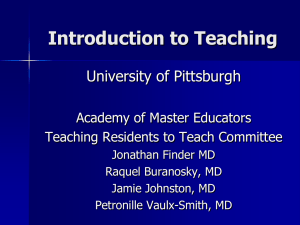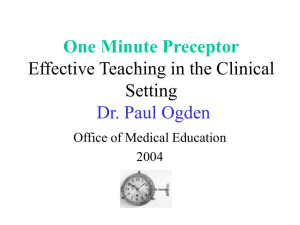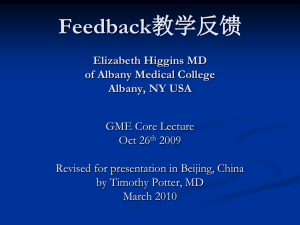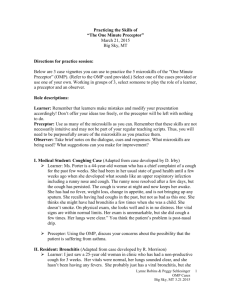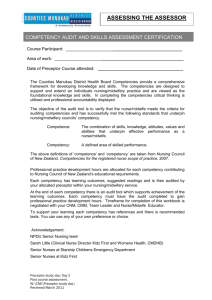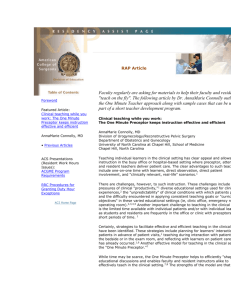Faculty evaluation – This form is anonymous. Do not put any
advertisement
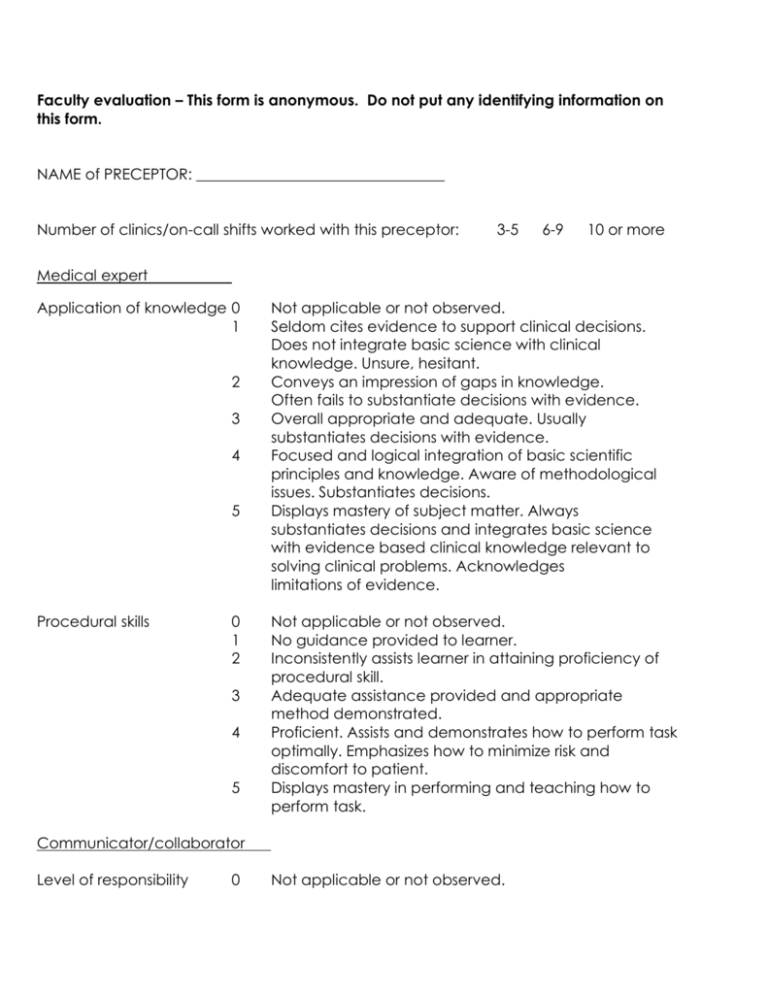
Faculty evaluation – This form is anonymous. Do not put any identifying information on this form. NAME of PRECEPTOR: _________________________________ Number of clinics/on-call shifts worked with this preceptor: 3-5 6-9 10 or more Medical expert Application of knowledge 0 1 2 3 4 5 Procedural skills 0 1 2 3 4 5 Not applicable or not observed. Seldom cites evidence to support clinical decisions. Does not integrate basic science with clinical knowledge. Unsure, hesitant. Conveys an impression of gaps in knowledge. Often fails to substantiate decisions with evidence. Overall appropriate and adequate. Usually substantiates decisions with evidence. Focused and logical integration of basic scientific principles and knowledge. Aware of methodological issues. Substantiates decisions. Displays mastery of subject matter. Always substantiates decisions and integrates basic science with evidence based clinical knowledge relevant to solving clinical problems. Acknowledges limitations of evidence. Not applicable or not observed. No guidance provided to learner. Inconsistently assists learner in attaining proficiency of procedural skill. Adequate assistance provided and appropriate method demonstrated. Proficient. Assists and demonstrates how to perform task optimally. Emphasizes how to minimize risk and discomfort to patient. Displays mastery in performing and teaching how to perform task. Communicator/collaborator Level of responsibility 0 Not applicable or not observed. 1 2 3 4 5 Health care team (nurses, others) 0 1 2 3 4 5 Makes learner feel redundant or insecure. Hard to get hold of. Not available when needed. Did not provide graded responsibility appropriate to level of training or patient acuity. Appropriate patient load and complexity for level of training. Learner felt responsible for patient care/treatment planning while receiving adequate support and back up. Learner felt respected. Preceptor always ready to help if needed. Not applicable or not observed. Unresponsive to questions/concerns of team members. Inconsistent or less than optimal attention to team members. Responds appropriately to team members questions/concerns. Proactive approach. Responds quickly and effectively. Facilitates involvement of team members. Decisions made by team respected and supported by preceptor. Manager Use of investigations 0 1 2 3 4 Not applicable or not observed. No discussion of appropriateness of investigations. Limited discussions. Appropriate. Discusses relevance and cost effectiveness of investigations. QA/QI 0 1 2 3 4 Not applicable or not observed. Avoids participation in QA/QI Silent participant in QA/QI Appropriate involvement in QA/QI Demonstrates mastery of QA/QI concepts and how to apply them to improve patient outcomes. Time management 0 1 2 Not applicable or not observed. Frequently late for clinic. Disorganized. Generally started and completed clinics within required time frame. 3 Always organized, prepared. Never late. 0 1 2 Not applicable or observed. Rarely identifies or reviews prevention strategies. Recognizes opportunities when prevention counseling could be offered. Actively involves patient and family in prevention and health promotion strategies. Health advocacy Health care promotion 3 Scholarly activity Teaching skills 0 1 2 3 4 5 Feedback skills 0 1 2 3 4 5 Not applicable or not observed. Rarely teaches. Unclear, limited or inappropriate teaching to level of learner. Seldom observes trainee in clinic or on ward. Occasionally teaches. Borderline ability to teach to level of trainee. Teaches when requested. Teaching directed to learner’s needs. Motivates self directed learning. Observed trainee in clinic or on ward. Scheduled regular teaching sessions. Master teacher. Made teaching a priority. Not applicable or not observed. Hardly ever provided feedback. Almost always gave negative feedback Infrequent or non-specific feedback. Regular feedback, both positive and negative. Frequent, constructive feedback. Immediate feedback with follow-up of deficiencies. Professional Patient care 0 1 2 3 Not applicable or not observed. Lacks empathy. Makes disparaging remarks of patient gender, race, disability, or socio-economic status. On occasion indifferent to patient needs. Knows patients well. Demonstrates concern for patients’ well-being. 4 5 Relations with colleagues and learners 0 2 3 4 5. Excellent rapport with patient and families. Sensitive and caring. Provides exemplary patient centred care at all times. Not applicable or not observed. Fails to maintain appropriate boundaries in work and learning situations. Makes disparaging remarks of coworker’s or learner’s gender, race, disability, or socioeconomic status. Inconsistent behavior that detracts from learning environment. Appropriate professional interactions. Develops positive relationships. Genuinely interested in learner’s needs and/or difficulties. Outstanding interpersonal skills. Superb teacher-learner relationship. Overall 0 1 2 3 Comments: Do not wish to work with this preceptor again. Some hesitation to work with this preceptor again. Fine to work with this preceptor again. One of the best preceptors I’ve worked with.


